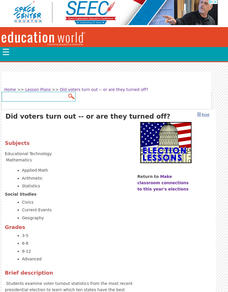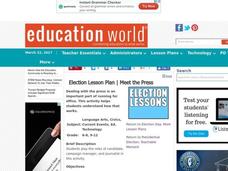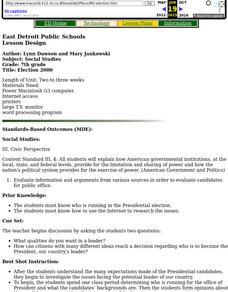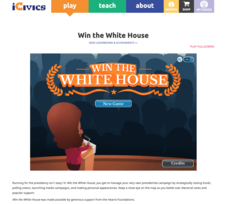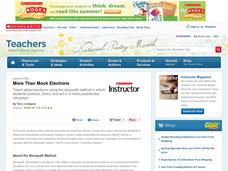Carolina K-12
Exploring the Electoral College
Does your vote really count? This activity helps young voters learn about the electoral college through a TED talk, a helpful handout, discussion prompts, and then a role-playing activity that has participants simulating an election on a...
Curated OER
Why Bother To Vote In Florida?
Fifth graders gain knowledge about the Florida 2000 Presidential Election, proposed changes in the process, and to practice communication skills, including listening and speaking. This lesson really gets at the heart of the changes made...
Curated OER
Lesson Plan: Bringing Out the Vote
Pupils explore voter turnout, analyzing why Americans don't vote, and citizen activism through creating community publicity about the 2004 Presidential election.
Curated OER
The 2004 Presidential Election
Young scholars examine the 2004 Presidential election between George W. Bush and John Kerry. Using a variety of primary source documents, they discover where the candidates stood on the issues. In groups, they create a tableau in which...
Curated OER
Did Voters Turn Out -- or Are They Turned Off?
What was the voter turnout at your last state election? Examine voter turnout statistics from the most recent election to learn which ten states have the best turnout record. This lesson plan offers election data, handouts, and worksheets.
Curated OER
The Constitution and the Right to Vote: Ch 6
The US Constitution dictates which members of society have the right to vote. After reading about amendments extending voting rights, your class answers these questions on the 15th, 14th, and 23rd amendments. Use as a quiz or to guide...
Curated OER
Meet the Press
Students participate in a role play revolving around political elections. The roles of candidate, campaign manager, and journalist emphasized in this activity. Students listen to candidate interviews that are available online.
Curated OER
The Last Word: Using Critical Thinking and Analysis to Reach a Decision
Want to explore the process of writing a persuasive essay and tie it in with the upcoming elections? Class members use Venn diagrams and the hamburger model of persuasive writing to write a five-paragraph essay on elections and...
Curated OER
The Brief American Pageant: The Stalemate Seventies
A glimpse of the political and economic contexts of the 1970's, this series of slides includes two graphs (median family income and Consumer Price Index) and a map that details the results of the 1972 Nixon-McGovern Presidential...
Curated OER
The Electoral Process
Students study the history and mechanics of the Electoral College and formulate opinions as to whether this institution should be preserved, modified or eliminated. They compare and contrast electoral and popular votes in the...
Curated OER
What Are the Issues?
Investigate and report on three issues related to a current election. Elementary aged learners research information about specific issues, develop an opinion, and write a persuasive essay using supporting details and evidence to support...
Curated OER
Voter Behavior
Transform your government students into informed voters with this straightforward worksheet. Five matching questions and five multiple choice questions test students' knowledge on voter behavior and political parties, and the format...
Curated OER
Rocking the Vote
Students explore how a presidential candidate can win the popular vote but not receive enough electoral votes to win the election. They analyze various regions' voting trends, explore how these trends reflect the outcome of the 2004...
Curated OER
Election Day Lesson: The True Story of the Three Little Pigs
Students read the story, The True Story Of The 3 Little Pigs and discuss the voting process. In this public opinion lesson plan, students review the original story of the three little pigs and then read the wolf's version of the story...
Curated OER
Election 2000
Seventh graders explore issues facing the potential leader of our country, form opinions about the candidates representing the two major political parties, research election material and choose candidates, conduct debates, and vote in...
Annenberg Foundation
Student Voices
Whether it's an election year or not, a unit on voting patterns and political campaigns will awaken the civic pride in your high school citizens. Divided into six parts, the curriculum covers various facets of an election, including...
iCivics
Win the White House
What does it take to win the White House? A video game allows young political operatives to try their hand at winning 1600 Pennsylvania Avenue by deciding on key issues, where and how to spend campaign dollars, and the role of polling...
Curated OER
Rural Communities Make a Difference
High schoolers research what analysts say influenced Ohio voters in a Presidential election and discuss what that meant in the election, especially in Ohio. Students use provide Internet sources for research.
Curated OER
More Than Mock Elections
Students create a presidential campaign story. In this presidential campaign lesson, students produce, direct and act in their own campaign story. Stories focus on setting, characters, context, critical incidents, and concluding events.
Curated OER
Election of 1860
Young scholars determine how the presidential election of 1860 led to the American Civil War. In this election of 1860 lesson, students discover details regarding the election and hold their own mock debate and election. Young scholars...
Curated OER
A Presidential Election Poll
In this math worksheet, students solve 4 story problems pertaining to the Bush-Gore election of 2000. Students use all math operations to solve these problems.
Curated OER
Let the Campaign Begin
Young scholars differentiate between positive and negative personal attributes and select a fictional character for nomination who personifies the qualities of a good leader. They use the Internet to learn about the election process and...
Curated OER
Ch. 1 Practice Exam
In this elections worksheet, students match 5 methods of counting votes for candidates to their descriptions. Students match 4 different types of fair candidates with their descriptions. Students problem solve 7 election scenarios.
Curated OER
Electoral Versus Popular Vote
Pupils gain an understanding of how the winner of the popular vote might not be the winner of the electoral vote by voting on a snack. They be divided into groups with a representative.






